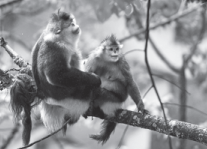Ranger shows monkeys humans can be kind


KUNMING-As the clock strikes 9 am, Yu Xiaode trudges through the lush forest of the nature reserve to visit his forest friends with an exquisitely-prepared breakfast and special treats of the day: in-shell peanuts, pumpkin seeds, corn and dried apples.
With the blow of a whistle, his friends-troops of black-and-white snub-nosed monkeys, also known as Yunnan golden hair monkeys, one of the world's most endangered species-will jump down from the trees, surround Yu, pick up the usnea lichen he leaves for them and savor their breakfast.
The mountainous forests of Southwest China's Yunnan province and neighboring Tibet autonomous region are the habitat of these monkeys, with most living in the Baima Snow Mountain National Nature Reserve.
As Yu continues his hike, he notices two monkeys start bickering all of a sudden. Yu stops upon hearing the jabbers, reproaching the two; the monkeys then separate and head into the forest.
Yu, 63, a forest ranger in Baima Snow Mountain National Nature Reserve in the Dechen Tibetan autonomous prefecture in Yunnan, stares at the monkeys attentively, unable to hide his joy and pride.
"The food we have prepared for them is an important supplement, and they need to obtain some other food in the mountains by themselves," Yu says as he ties the bag that contains the monkeys' dinner, adding that they won't come to steal food because they are well-behaved.
According to Yu, besides feeding them, he often comes to the woods to replenish the water. He also rushes over to rescue and tend to the monkeys when they get injured.
He has traveled almost every inch of the area over the past 12 years.
As a result of his continuous efforts, he has cultivated an ability to make discerning judgments about the monkeys even at a glance, from afar.
Yu knows the temperament and family status of each monkey. He even named the alpha males of the monkey troops and mentions each monkey with great familiarity.




































